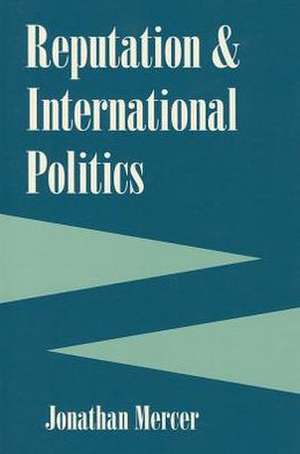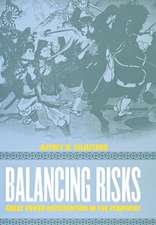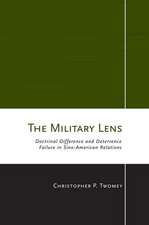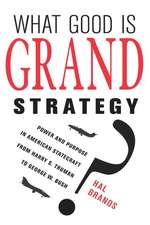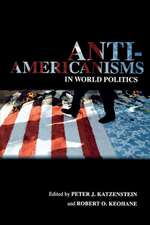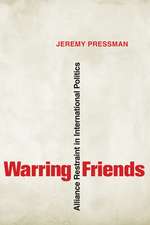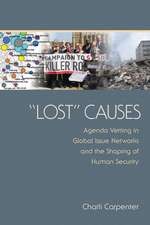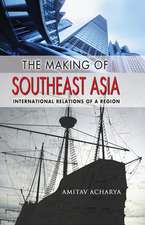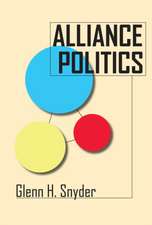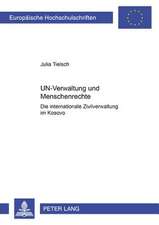Reputation and International Politics: Cornell Studies in Security Affairs
Autor Jonathan Merceren Limba Engleză Paperback – 7 iul 2010
By approaching an important foreign policy issue from a new angle, Jonathan Mercer comes to a startling, controversial discovery: a nation's reputation is not worth fighting for. He presents the most comprehensive examination to date of what defines a reputation, when it is likely to emerge in international politics, and with what consequences. Mercer examines reputation formation in a series of crises before World War I. He tests competing arguments, one from deterrence theory, the other from social psychology, to see which better predicts and explains how reputations form. Extending his findings to address recent crises such as the Gulf War, he also considers how culture, gender, and nuclear weapons affect reputation. Throughout history, wars have been fought in the name of reputation. Mercer rebuts this politically powerful argument, shows that reputations form differently than we thought, and offers policy advice to decision-makers.
| Toate formatele și edițiile | Preț | Express |
|---|---|---|
| Paperback (1) | 274.27 lei 43-57 zile | |
| MB – Cornell University Press – 7 iul 2010 | 274.27 lei 43-57 zile | |
| Hardback (1) | 449.33 lei 43-57 zile | |
| Wiley – 17 ian 1996 | 449.33 lei 43-57 zile |
Din seria Cornell Studies in Security Affairs
-
 Preț: 254.66 lei
Preț: 254.66 lei -
 Preț: 287.02 lei
Preț: 287.02 lei -
 Preț: 115.88 lei
Preț: 115.88 lei -
 Preț: 155.47 lei
Preț: 155.47 lei -
 Preț: 248.19 lei
Preț: 248.19 lei -
 Preț: 163.94 lei
Preț: 163.94 lei -
 Preț: 121.64 lei
Preț: 121.64 lei -
 Preț: 116.92 lei
Preț: 116.92 lei -
 Preț: 147.82 lei
Preț: 147.82 lei -
 Preț: 140.64 lei
Preț: 140.64 lei -
 Preț: 145.90 lei
Preț: 145.90 lei -
 Preț: 154.39 lei
Preț: 154.39 lei -
 Preț: 147.84 lei
Preț: 147.84 lei -
 Preț: 231.77 lei
Preț: 231.77 lei -
 Preț: 136.31 lei
Preț: 136.31 lei -
 Preț: 233.12 lei
Preț: 233.12 lei -
 Preț: 159.62 lei
Preț: 159.62 lei -
 Preț: 166.80 lei
Preț: 166.80 lei -
 Preț: 143.72 lei
Preț: 143.72 lei -
 Preț: 181.67 lei
Preț: 181.67 lei -
 Preț: 326.47 lei
Preț: 326.47 lei -
 Preț: 133.63 lei
Preț: 133.63 lei -
 Preț: 247.92 lei
Preț: 247.92 lei -
 Preț: 339.49 lei
Preț: 339.49 lei -
 Preț: 146.59 lei
Preț: 146.59 lei -
 Preț: 164.13 lei
Preț: 164.13 lei -
 Preț: 155.27 lei
Preț: 155.27 lei -
 Preț: 258.54 lei
Preț: 258.54 lei -
 Preț: 309.71 lei
Preț: 309.71 lei -
 Preț: 341.43 lei
Preț: 341.43 lei -
 Preț: 141.33 lei
Preț: 141.33 lei -
 Preț: 283.96 lei
Preț: 283.96 lei -
 Preț: 317.56 lei
Preț: 317.56 lei -
 Preț: 155.59 lei
Preț: 155.59 lei -
 Preț: 232.20 lei
Preț: 232.20 lei -
 Preț: 153.84 lei
Preț: 153.84 lei
Preț: 274.27 lei
Nou
52.49€ • 54.60$ • 43.33£
Carte tipărită la comandă
Livrare economică 14-28 aprilie
Specificații
ISBN-10: 0801474892
Pagini: 248
Dimensiuni: 162 x 226 x 15 mm
Greutate: 0.39 kg
Editura: MB – Cornell University Press
Seria Cornell Studies in Security Affairs
Descriere
By approaching an important foreign policy issue from a new angle, Jonathan Mercer comes to a startling, controversial discovery: a nation's reputation is not worth fighting for. He presents the most comprehensive examination to date of what defines a reputation, when it is likely to emerge in international politics, and with what consequences. Mercer examines reputation formation in a series of crises before World War I. He tests competing arguments, one from deterrence theory, the other from social psychology, to see which better predicts and explains how reputations form. Extending his findings to address recent crises such as the Gulf War, he also considers how culture, gender, and nuclear weapons affect reputation. Throughout history, wars have been fought in the name of reputation. Mercer rebuts this politically powerful argument, shows that reputations form differently than we thought, and offers policy advice to decision-makers.
